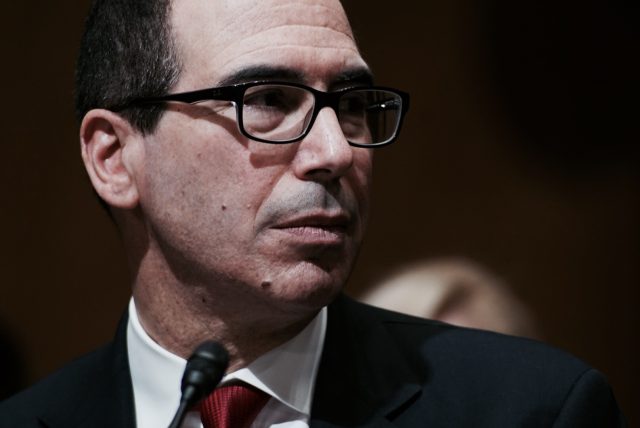Mnuchin dismisses allegations of predatory practices at OneWest Bank
WASHINGTON – Secretary of the Treasury nominee Steven Munchin, a prominent investment banker, denied accusations that while he was CEO of OneWest the bank engaged in overzealous home foreclosure and predatory lending practices.
“Since I was first nominated to serve as Treasury Secretary, I have been maligned as taking advantage of other’s hardships in order to earn a buck. Nothing could be further from the truth,” Mnuchin told the Senate Committee on Finance during his confirmation hearing on Thursday.
“During the summer of 2008, I saw the devastation that was caused by the housing crisis when I watched people line up to get their savings out of IndyMac bank. It was the middle of the housing crisis and despite global panic, I saw a way to save the bank.”
Mnuchin described how shortly thereafter he and several investors purchased the bankrupt housing lender from the Federal Deposit Insurance Commission (FDIC) and later renamed the company OneWest.
Mnuchin rehabilitated the troubled bank and oversaw its widespread expansion before the institution was sold to CIT Group in 2014 for $3.4 billion.
In his opening statement, Mnuchin also dismissed accusations that his stewardship of the failed IndyMac helped facilitate the 2008 housing crash.
“Let me be clear: My group had nothing to do with the creation of risky loans in the IndyMac loan portfolios,” Mnuchin said. “When we bought the bank, we assumed these bad loans which had been originated by previous management. Some of those individuals had to answer to federal authorities for their bad lending decisions.”
House Majority Leader Kevin McCarthy (R-Calif.) and House Financial Services Committee Chairman Jeb Hensarling (R-Texas) both spoke in favor of the nomination.
Committee Chairman Orrin Hatch (R-Utah.) in his opening statement described Mnuchin as an experienced “problem solver” in the financial sector and said any suggestion that the nominee is not qualified to serve as Treasury Secretary should be considered as “stupid arguments.”
Hatch also said: “No one has credibly alleged that any laws, regulations, or industry standards were violated by companies run by Mr. Mnuchin.”
But Ranking Democrat Ron Wyden (D-Ore.) slammed Mnuchin in his opening statement.
“When you read about the nominee for Treasury Secretary, given all the power that position holds, you hope not to see phrases like ‘foreclosure machine,’ ‘redlining,’ ‘offshore funds,’ and ‘predatory lending.’ ”
Wyden hammered Mnuchin for OneWest’s supposedly overzealous foreclosure practices as well as allegations related to the bank’s failure to equitably provide loans to minority applicants.
Following Wyden’s opening statement, Sen. Pat Roberts (R-Kan.) provoked outrage by suggesting that the Oregon senior senator should take a sedative to calm down.
“Sen. Wyden, I’ve got a Valium pill here that you might want to take for a second round,” Roberts sarcastically quipped.
Sen. Sherrod Brown (D-Ohio.) said he was not amused by the remark and lashed out at Roberts in defense of Wyden.
“I just can’t quite believe that the senator would say that,” Brown interjected. “I just hope that doesn’t set the tone for 2017.”
The exchange ended a few minutes later with a half-hearted apology from Roberts.
Wyden probed Mnuchin as to the reason he chose to place certain assets offshore.
“Mr. Mnuchin you ran a hedge fund for a few years starting in 2004 and I’m trying to get my arms around the Mnuchin web of bank accounts and shell companies that were in the Cayman Islands and Anguilla,” Wyden explained.
“How many employees did you have in Anguilla?,” Wyden asked.
“We didn’t have any employees in Anguilla,” Mnuchin said.
“How many customers did you have there?,” Wyden asked.
“We didn’t have any customers that resided in Anguilla,” Mnuchin said.
“Did you have an office there?,” Wyden asked.
“We did not have a office ourselves there,” Mnuchin said.
“So you just had a post office box?” Wyden insisted.
Mnuchin first tried to dodge Wyden’s line of questioning but eventually contended that his decision to use offshore accounts was not motivated by tax considerations.
“As it relates to my own tax situation … U.S. corporations and U.S. partnerships – in no way did I use them whatsoever to avoid any U.S. taxes,” Mnuchin explained. “They were merely as accommodation to pension funds and non-profit institutions and a small number of foreign investors, and as Treasury Secretary if I’m confirmed I would look at these rules,” Mnuchin said in relation to agreeing to reviewing tax loopholes used by wealthy individuals.
Sen. Bob Menendez (D-N.J.) slammed Mnuchin for not having promptly provided the committee with information about certain financial assets, and the senior New Jersey senator rejected Mnuchin’s claim that many of the disclosure forms were “very complicated.”
“It doesn’t take a rocket scientist to understand: ‘list all entities,” Menendez insisted.
Regarding fiscal policy Mnuchin said he favors raising the debt ceiling “sooner rather than later,” and suggested that tax cuts would help stimulate economic growth.
Mnuchin, 54, worked at Goldman Sachs for nearly two decades in positions that included serving as head of the mortgage securities department and executive vice president.
Mnuchin departed Goldman in 2002 with more than $45 million in company stock.
Several years later Mnuchin and several former colleagues created a new hedge fund called Dune Capital Management whose investments included financing real estate owned by Donald Trump.
Around that time Mnuchin financed several Hollywood films as well.
OneWest has been the subject of allegations related to overzealous home foreclosure and discriminatory lending practices.
President-elect Donald Trump chose Mnuchin to head the Treasury Department in late November.
Mnuchin served as Trump’s national finance chair during the presidential campaign and until recently was a Democrat.
This article was republished with permission from Talk Media News

Bryan is the managing editor of Baltimore Post-Examiner.
He is an award-winning political journalist who has extensive experience covering Congress and Maryland state government. His work includes coverage of the first election of President Donald Trump, the confirmation hearings of Supreme Court Justice Brett Kavanaugh and attorneys general William Barr and Jeff Sessions, the Maryland General Assembly, Gov. Larry Hogan, and the COVID-19 pandemic.
Bryan has broken stories involving athletic and sexual assault scandals with the Baltimore Post-Examiner.
His original UMBC investigation gained international attention, was featured in People Magazine and he was interviewed by ABC’s “Good Morning America” and local radio stations. Bryan broke subsequent stories documenting UMBC’s omission of a sexual assault on their daily crime log and a federal investigation related to the university’s handling of an alleged sexual assault.

